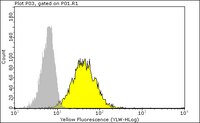MAB1288 Sigma-AldrichAnti-HLA-B7 Antibody, clone BB7.1, PE Conjugate
This Anti-HLA-B7 Antibody, clone BB7.1, PE Conjugate is validated for use in FC for the detection of HLA-B7.
More>> This Anti-HLA-B7 Antibody, clone BB7.1, PE Conjugate is validated for use in FC for the detection of HLA-B7. Less<<Productos recomendados
Descripción
| Replacement Information |
|---|
Tabla espec. clave
| Species Reactivity | Key Applications | Host | Format | Antibody Type |
|---|---|---|---|---|
| H | FC | M | Phycoerythrin | Monoclonal Antibody |
| References |
|---|
| Product Information | |
|---|---|
| Format | Phycoerythrin |
| Control |
|
| Presentation | Purified mouse immunoglobulin in phosphate buffered saline, pH 7.4, containing 0.2% bovine Serum albumin and 0.1% sodium azide. |
| Quality Level | MQ100 |
| Physicochemical Information |
|---|
| Dimensions |
|---|
| Materials Information |
|---|
| Toxicological Information |
|---|
| Safety Information according to GHS |
|---|
| Safety Information |
|---|
| Packaging Information | |
|---|---|
| Material Size | 100 assays |
| Transport Information |
|---|
| Supplemental Information |
|---|
| Specifications |
|---|
| Global Trade Item Number | |
|---|---|
| Número de referencia | GTIN |
| MAB1288 | 04053252668111 |
Documentation
Anti-HLA-B7 Antibody, clone BB7.1, PE Conjugate Ficha datos de seguridad (MSDS)
| Título |
|---|
Anti-HLA-B7 Antibody, clone BB7.1, PE Conjugate Certificados de análisis
Referencias bibliográficas
| Visión general referencias | Pub Med ID |
|---|---|
| Monoclonal antibodies for analysis of the HLA system. Brodsky, F M, et al. Immunol. Rev., 47: 3-61 (1979) 1979 | 95015
 |







